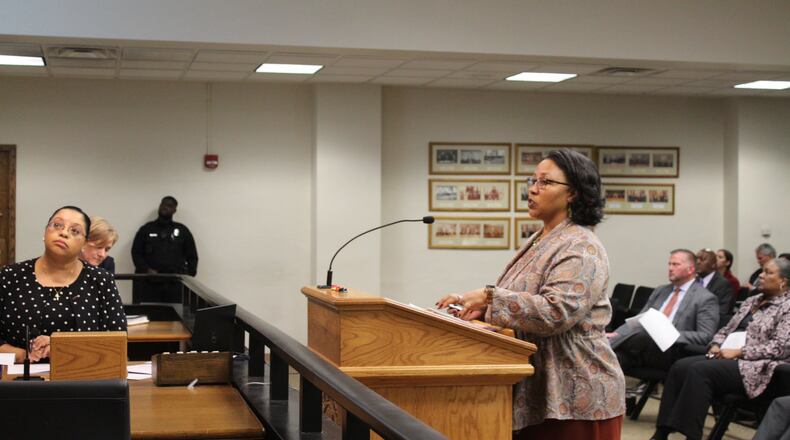Minority and women-owned firms account for about 22% of businesses available in the Dayton market, but were the prime contractors for 8% of city contracts in that time frame, the study found.
Women and minorities are getting a greater share of city business than they have in past decades, but there’s still plenty of room for improvement, officials said.
"We're going to continue to move forward to address disparities, as we look at improving our internal processes and procedures, and how we can continue to create an ecosystem that allows for opportunities, experience, growth and inclusion of our small, minority- and women-owned businesses, " said Erica Fields, executive director of Dayton's Human Relations Council.
MORE: How your business may fit Dayton’s small business contracting program
MGT Consulting reviewed all city expenditures between 2013 and 2017, and analyzed contracts for industries including construction, professional services, goods and supplies, architecture and engineering and other services.
MGT said as part of its work it received anecdotal feedback from nearly 1,000 firms in the market area via public meetings, interviews and surveys.
Generally speaking, the disparity study is a guide for the city, and shows how well it is doing about reaching its inclusion and equity goals in the contracting and procurement process, said Dayton City Manager Shelley Dickstein.
“We want to make sure there’s equitable access to getting contracts,” she said.
MGT found that firms belonging to black owners were utilized for less than 1% of the city’s prime contracts studied, even though they account for nearly 3% of the available firms in the Dayton market.
Hispanic firms accounted for about 1.7% of the market but received less than 0.01% of city dollars for prime contracts, the study found.
Nonminority, women-owned firms received about 7.1% of city spending, despite the fact that they make up nearly 15% of available firms, the study found.
Asian- and Native American-owned firms also were underutilized.
MORE: Being black in Dayton: Can’t close the money gap
This was Dayton’s third generation disparity study. The city paid for disparity studies that were conducted or completed in 1989 and 2008.
In response to its first disparity study, the city in 1991 passed a resolution implementing the procurement enhancement program, which is overseen by the Human Relations Council and is intended to help ensure that minority-owned, women-owned and small-business enterprises get an "equitable" share of city contracts.
Disparity studies provide legal justification for race- and gender-specific goals for the procurement process, Fields said, and they can help determine whether the city’s programs aimed at helping disadvantaged businesses are effective.
MGT of America oversaw Dayton's second-generation disparity study in 2008, which reviewed spending between 2001 to 2006.
The 2008 study found that about 4.7% of prime construction contracts went to women- and minority-owned firms.
About 1.8% of prime contracts for other services and 1.4% of prime contracts for supplies similarly went to disadvantaged firms.
Less than 1 percent of prime professional services and architecture and engineering contracts went to these historically underutilized companies.
MORE: ‘Opportunity gap’ creates achievement gap for poor, black children in Dayton schools
The city has made improvements since the last disparity report, but there are still gaps between availability and utilization of minority and women firms in all procurement categories and disadvantaged business classifications, MGT said.
“Overall, disparities still continue to exist in all (business) categories with all ethnic groups,” said Vernetta Mitchell, senior consult with MGT Consulting who managed the project.
MGT said a disparity index that is 80 or less demonstrates substantial under-utilization.
The study found that the city’s minority and women-business enterprise disparity index was 36.92, which is “statistically significant underutilization.”
Feedback from minority and women-business enterprises revealed that common barriers to getting city business include difficulties competing with large firms and contracts being too bIG, MGT said.
Some firms complained that they lacked access to capital to grow their businesses or found out about potential opportunities too late
MGT has recommended setting project-specific diversity goals on all formal procurement activities.
Mitchell said the city also should collect data about non-disadvantaged firms related to subcontractors and suppliers.
MGT said the city department overseeing the procurement program needs to increase staffing levels to handle outreach, bid evaluation, monitoring, goal setting, reporting and compliance.
RELATED: Corruption charges: What city is doing to prevent contracting fraud
The disparity study is important to the city and its citizens because local, disadvantaged firms should get a fair share of city projects, said Dayton City Commissioner Jeff Mims Jr.
Commissioner Matt Joesph added: “We’ve found over the years that this process is one that never really ends. You’ve got to keep working at it, you’ve got to keep working at it.”
About the Author

